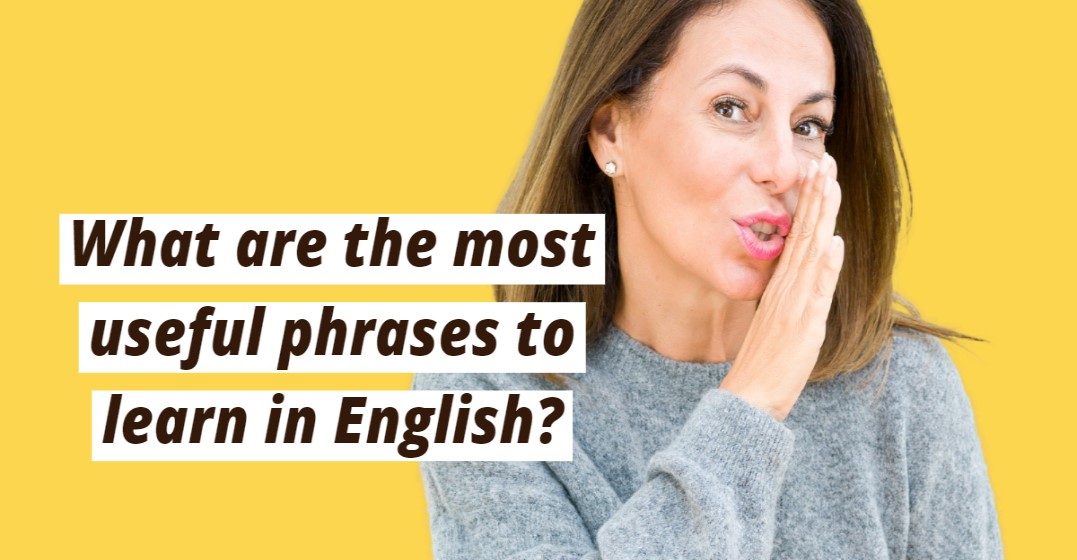Top 20 phrases for English beginners
Published on August 6, 2019 / Updated on January 10, 2024
When you’re starting to learn, you want to know the phrases you are going to use the most often.
We have listed 20 of them below. These are phrases native English speakers use. They’ll help you out in the office, the pub, and the street!
Try to learn 5 of them at a time. Practise saying them when you are alone first. Then, try to use them in conversation next time you are in the UK, or in a different country when you’re trying to speak English. Remember to learn the whole phrase, not just the words on their own. This will help you remember it.
The most important question: What’s your name? English speakers don’t usually say what is your name? What’s is more natural.
Answer with: My name’s (Jane). And yours? This is a natural way to ask for that person’s name.
And second: Where are you from? Lots of people will ask you this!
Answer with: I’m from (Spain). Or I’m from (Madrid).
And third: What do you do? This means: What is your job? It is a very common question to ask in the UK.
Answer with: I’m a (doctor)/I’m an (engineer). And you?
And finally not a question. People will ask you why you are in their country or what you are doing there. You can say: I’m on holiday here.
English speakers have lots of ways to ask how are you? But how are you? is quite formal, so try the questions here. These questions are more informal – you can use them with your English friends.
How’s it going?
How’s life?
Answer with: Great/fine/pretty good. English people don’t say bad or terrible. We are optimistic!
If you want people to know you don’t speak English, you can tell them: Sorry, I don’t speak English. Or, after a few lessons: I speak a little English.
If you don’t understand the first time someone says something, ask: Can you repeat that, please? This means, say it again. Remember to use the word please a lot in English!
English speakers talk quickly, even to people from other countries! Ask: Can you speak more slowly, please?
You can also say: Sorry, I don’t understand. Use this when you want someone to tell you in another way. Also, sorry is another word that English people really like, so use it when you can.
If you want to ask something, say: Excuse me, I have a question. You can use this phrase in class, or any time you don’t understand something.
If you want attention or to get past someone say: Excuse me.
You know the phrase thank you, but English speakers say Thanks very much a lot too. It is stronger but less formal.
To reply when someone says thank you to you say: You’re welcome/my pleasure/no problem. No problem is less formal than the first two; young people use this phrase a lot.
Yes and no are easy words to learn, but they are 100% sure. Sometimes you want to say yes or no in a less sure way.
To say yes use: I think so. This means probably yes but I’m not 100% sure. If your friend asks, Does Julian speak English? You say: I think so. Ask him!
To say no use: I don’t think so. This means probably not but I’m not 100% sure.
If your friend asks: Are you coming to the party tonight? You say: I don’t think so.I start work at 7am tomorrow.
If you are 50/50, say : Maybe. If your friend asks: Are you going to the cinema tonight? You can say: Maybe. I have a lot of work to do.
Remember! We don’t say I think yes, I think no, or maybe yes, maybe no in English. Just use the phrases above.
You know the words goodbye and bye, but a popular way to say this in English is: See you later! It is less formal than goodbye so you can say it to your friends.
I hope these phrases are useful for you. Good luck on your English journey!
If you’d like to learn more English phrases, visit our website and sign up for your Lingoda trial. You’ll take classes with native speaking teachers, and improve your speaking skills – quickly!
